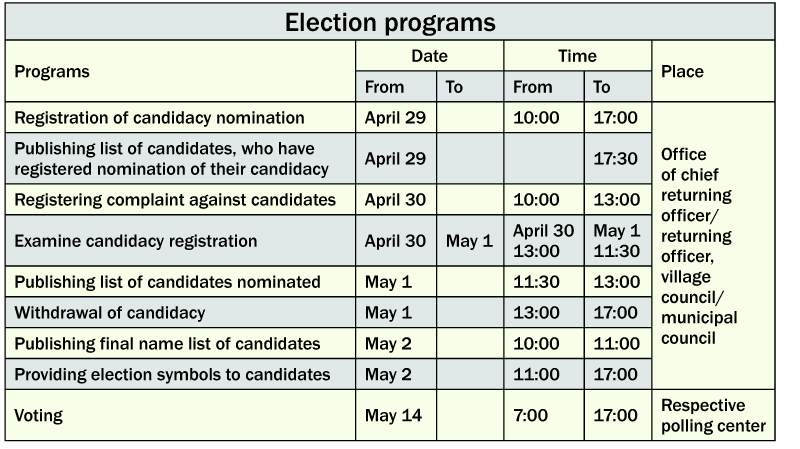
OR
EC unveils polls work plan, awaits LLRC report
Published On: February 23, 2017 12:40 AM NPT By: Bhadra Sharma

EC commissioner vows to conduct local polls within stipulated timeframe
KATHMANDU, Feb 23: Three days after the announcement of the poll date, the Election Commission (EC) on Wednesday unveiled a detailed election work plan, giving impetus to the conduct of the long-delayed local polls .
A board meeting of the election body has decided to wrap up the elections in all 719 local units within 16 days of the start of the election process. According to the election work plan, the registration of candidacies will begin on April 29. Representatives of the parties and independent candidates can register their candidacies from 10 a.m. to 5 p.m. and the election offices will make public details concerning the candidates within the same day.
On April 30, voters can lodge any complains against individuals contesting the elections. The EC is scheduled to finalize the list of candidates and allocate election symbols to them on May 2. The government has announced May 14 as the date for holding the local level elections across the country.
"In unveiling this election work plan, we are expressing our firm commitment to making the local elections a success, and within the stipulated deadline. We are dead certain we can make it possible," said Election Commissioner Ishwori Prasad Paudyal, after unveiling the work plan.
The EC, which is under pressure to conduct the elections within a limited time span, has already begun its preparations. It is preparing to hold the polls in 719 local units, as per the provisions of the constitution promulgated in September 2015. The real preparations, however, are being held up with the government failing to come out with the report of the Local Level Restructuring Commission (LLRC), according to commissioners.
Although the EC has recommended 719 local units across the country along with their boundaries, the government is in a fix when it comes to implementing the LLRC report as the Madhes-centric parties refuse to accept it. These agitating parties have been demanding the allocation of at least half the local units in the 20 districts of the southern plains.
In a bid to address this issue, the government has constituted a taskforce. With the delay in the LLRC report, the election body has been unable to deploy officials to the local units and fix the polling stations. "We are definitely under pressure because of the delay in settling the exact status of the local units. But we will overcome the challenges," said Paudyal.
So far, the EC has assessed the number of parties contesting the local polls and updating the voter registration has been completed. According to its assessment, the EC has to arrange ballot papers for up to 45 parties. The maximum number of political parties contesting (45) has been recorded in Kathmandu, with the minimum (6) recorded in Manang.
On voter rolls update, the EC has already registered over 250,000 new voters in the course of a nationwide mobile voter registration campaign launched with the upcoming three sets of elections in mind. "But we need to verify them and that will take another month," said EC spokesperson Surya Prasad Sharma.
As many as 12.21 million voters were registered for the 2013 Constituent Assembly elections. The EC has begun voter registration with photos and fingerprints, following controversies regarding voter numbers in the 2008 CA election. Some of the candidates polled more votes than the actual number of voters recorded in the voter rolls.
19-point directive
The EC has issued a 19-point directive to the government for creating a conductive environment for elections. It has asked the government and other stakeholders to assist it in conducting the elections in a free and fair manner.
The EC board meeting has asked the government to implement the election code of conduct effectively, provide the essential technical, logistical and human resources and assure foolproof security prior to and during the elections. Officials at the EC said they are preparing to enforce the code of conduct for the government, the political parties, I/NGOs and the media, within the next week.
The government has been asked to provide details about state-owned university, school and community buildings across the country and make these functional so that the EC can use these whenever required.
You May Like This

EC wants date, LLRC report at once if poll to be held by May
KATHMANDU, Feb 6: In response to the government's letter, the Election Commission (EC) on Sunday urged the government to fix the... Read More...

Demarcation report must be in 120 days before local polls: EC
KATHMANDU,June28: The Election Commission has said that it should get the report of the commission on local bodies numbers and... Read More...

EC wants schools closed for 7 days for May 14 polls
KATHMANDU, May 4: The Election Commission (EC) has asked the Ministry of Education (MoE) to close the educational institutions for seven... Read More...




Just In
- Govt receives 1,658 proposals for startup loans; Minimum of 50 points required for eligibility
- Unified Socialist leader Sodari appointed Sudurpaschim CM
- One Nepali dies in UAE flood
- Madhesh Province CM Yadav expands cabinet
- 12-hour OPD service at Damauli Hospital from Thursday
- Lawmaker Dr Sharma provides Rs 2 million to children's hospital
- BFIs' lending to private sector increases by only 4.3 percent to Rs 5.087 trillion in first eight months of current FY
- NEPSE nosedives 19.56 points; daily turnover falls to Rs 2.09 billion















Leave A Comment